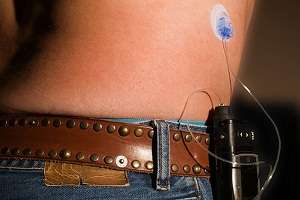Reducing diabetics' hypoglycaemic events

Insulin pumps that can respond to blood glucose concentration can reduce the rate of severe hypoglycaemia (low blood glucose) in type 1 diabetics, according to the results of a recent trial.
The clinical trial was recently published in The Journal of the American Medical Association and showed that the average duration of hypoglycaemia was also significantly lower in individuals using sensor-augmented insulin pumps compared to those using standard insulin pump therapy.
The sensor-augmented pump, released in 2009, automatically suspends insulin delivery for up to two hours when glucose levels fall below a threshold concentration.
In this study, sensor-augmented pumps were compared to standard insulin pumps for a period of six months in 95 individuals with type 1 diabetes and impaired hypoglycaemia awareness.
Impaired awareness of hypoglycaemia occurs in about 30 per cent of type 1 diabetics whose risk of severe hypoglycaemic events is 3-6 times greater than those without reduced awareness.
Princess Margaret Hospital Department of Endocrinology and Diabetes Professor Timothy W Jones says that "the major known factor leading to impaired awareness is hypoglycaemia itself, which reduces symptom responsiveness in individuals".
Study participants were recruited from hospitals in WA between December 2009 and January 2012, and had previously been treated with standard insulin pump therapy for at least six months.
The researchers monitored the incidence of severe (seizures or coma) and moderate (requiring treatment/intervention) hypoglycaemia.
"Severe hypoglycaemia results in confusion and drowsiness, and if more severe unconsciousness and seizures," Prof Jones says.
A majority of severe hypoglycaemia episodes occur during the night, but alarm systems are only partially effective as patients may not wake up to the sound of an alarm.
At the end of the six month trial period, low glucose levels during the overnight period were lower in patients using the sensor-augmented pump.
In addition, no seizure or coma episodes occurred in the group using sensor-augmented pumps despite these continuing at the same rate in the standard insulin therapy group.
The sensor-augmented pumps reduced the duration and magnitude of hypoglycaemia but did not eliminate it altogether.
"As the systems develop further and become easier to use, they are likely to become standard therapy," Prof Jones says.
He says that the next step will be to predict a hypoglycaemic episode before it occurs.
"We are about to start a trial of a system that has an algorithm embedded that predicts hypoglycaemia and switches off insulin prior to hypoglycaemia developing," he says.
















